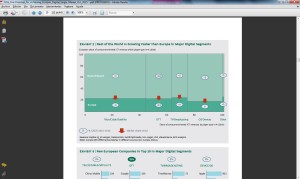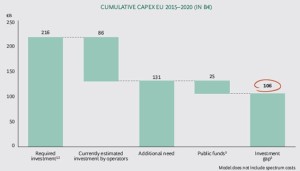 Patrick Lopez
Patrick Lopez
Responsable de Innovación en Redes en Telefónica I + D
On October 13th the Boston Consulting Group will publish a report, commissioned by ETNO, highlighting the five priorities for achieving Europe’s Digital Single Market. The objective is to positively influence the current European debate aimed at reviewing the whole regulatory framework for creating the right conditions to foster digital networks and services. According to the BCG report, the five top priorities are:
- Ensuring consistent standards across digital services for consumers and companies.
- Analyzing the market structure with regard to optimum investment and growth.
- Adapting wholesale market regulations to drive investments in next generation access (NGA).
- Modernizing spectrum policy to cover accelerated demand.
- Enabling specialized services with guaranteed network quality needs.
This report will be presented at the FT-ETNO Summit on October 13th in Brussels where high level representatives from the ICT sector and regulators will attend, including Vice-President for the Digital Single Market, Andrus Ansip, and Commissioner for Digital Economy and Society, Günther Oettinger.
The BCG report comes at the right moment to influence the European Commission which has recently launched several public consultations in order to assess how the current regulatory framework should be reviewed.
The Boston Consulting Group has just published a report highlighting the five top priorities for achieving Europe’s Digital Single Market. This report has been presented at the FT-ETNO Summit on October 13th in Brussels where high level representatives from the ICT sector and regulators have attended, including Vice-President for the Digital Single Market, Andrus Ansip, and Commissioner for Digital Economy and Society, Günther Oettinger.
The BCG report comes at the right moment when the European Commission is about to assess how the current regulatory framework should be reviewed for creating the right conditions to foster digital networks and services in the EU.
A new shift on regulation is needed
Above all the BCG report recognises the need for creating a regulatory framework that encourages investment in telecom infrastructures and calls for a level playing field among all Internet and telecom players in order to make Europe grow at a faster speed in line with other developed countries in other regions.
The Rest of World Is Growing Faster than Europe in Major Digital Segments
 According to the BCG report, global consumer-oriented ICT revenues are projected to grow 5 percent a year from 2014 to 2019, but Europe is growing more slowly and its share is expected to decline by 2 percentage points over this period. Across the four segments of the digital sector—telecommunications, OTT content and service providers, TV and other broadcast, and operating systems and devices—Europe’s market share is expected to stay flat or fall.
According to the BCG report, global consumer-oriented ICT revenues are projected to grow 5 percent a year from 2014 to 2019, but Europe is growing more slowly and its share is expected to decline by 2 percentage points over this period. Across the four segments of the digital sector—telecommunications, OTT content and service providers, TV and other broadcast, and operating systems and devices—Europe’s market share is expected to stay flat or fall.
EU Digital Agenda Targets Require an Additional €106 Billion in Investments
 The total amount of investment required for handling the fast-rising demand is estimated in €216Bn. Although European telecom operators are investing heavily, €86Bn by 2020, the BCG report estimates an investment gap of €106Bn that needs to be promoted.
The total amount of investment required for handling the fast-rising demand is estimated in €216Bn. Although European telecom operators are investing heavily, €86Bn by 2020, the BCG report estimates an investment gap of €106Bn that needs to be promoted.
Policy recommendations on the top 5 priorities (summary):
To reach the goal of a real European Digital Single Market, according to the BCG report, Europe policymakers need to move swiftly and decisively in five priority areas:
- Ensuring consistent standards across digital services for consumers and companies:
The same rules should be applied to all services across the Internet value chain in terms of privacy and data security, commercialization of data, transparency, quality of service, emergency services, any-to-any connectivity and portability. This implies no discrimination by player type for either application-based or network-based digital services.
- Analyzing the market structure with regard to optimum investment and growth:
The telecom sector needs scale and consolidation is expected to lead to improved margins, more investment and lower unit prices. European competition policy with respect to the telecommunications ecosystem—especially the criteria for merger review and the focus of merger remedies—needs to be rethought for the digital age.
Regulation should shift from price as the dominant regulatory objective to a more comprehensive and balanced assessment that includes investment, technical progress, innovation, efficiency, and quality of service. It should also include the impact of OTT-based competition in the markets.
- Adapting wholesale market regulations to drive investments in next-generation access (NGA):
Wholesale regulation needs to be changed in a simpler, market-based, and technological agnostic approach, bearing in mind the convergence of technologies (cable and mobile as well as fiber and copper). Light-touch ex-post regulation should be the rule and ex-ante regulation the exception, especially refraining from setting prices up front and from mandating wholesale access products where they are not necessary and relying on commercial arrangements and prices, with dispute resolution by national regulatory authorities.
- Modernizing spectrum policy to cover accelerated demand:
Policymakers should ensure all spectrum needs are allocated in a more harmonized, predictable framework and with reasonable prices and conditions, avoiding excessive prices that are in detriment of investment.
- Enabling specialized services with guaranteed network quality needs:
Regulation should realize that network quality and specialized services are critical for many digital services, such as e-health, connected cars and high quality video services. Therefore services with higher quality of service and network requirements should be allowed based on commercial business models.
Conclusions:
According to BCG report, for Europe to catch up with other more advanced digital economies, it will need to address a full reform of regulatory and competition conditions. The report provides insights on the reforms needed on the top five key areas and provides a number of detailed recommendations which are designed to contributing to reach the Digital Single Market, more specifically with regard to connectivity and digital services.
It is now time for Europe to put the necessary measures into action!







